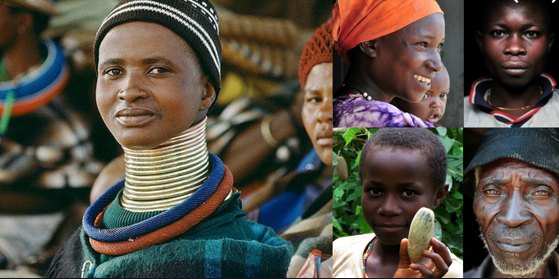Hidden secrets in African genomes revealed by large scale sequencing

Last Updated on October 30, 2019 by Joseph Gut – thasso
October 20, 2019 – Sequencing African genomes yields new data resource with broad applicability. By collaborating globally in a new, large-scale effort, researchers have made strong progress in sequencing genomes from regions and countries across Africa. These findings will enable more broadly representative and relevant studies ranging from basic through clinical genetics. The researchers’ new data and preliminary observations were presented as a featured plenary abstract at the American Society of Human Genetics 2019 Annual Meeting in Houston.
Of the 426 genomes sequenced, 320 were analyzed at high depth. This allowed the researchers to examine rare genetic variants in an accurate and quantifiable way, in addition to the common variants that have been the focus of most of the previous genetic studies in Africans. The researchers found an impressive breadth of genomic diversity among these genomes, and each ethnolinguistic group was carrying unique genetic variants. There was great variation among people in the same region of Africa, and even among those from the same country. These data of course reflect the deep history and rich genomic diversity across Africa, from which we can learn much about population history, environmental adaptation, and susceptibility to diseases.
Beyond the sheer amount of variation within and among the groups studied, the researchers were able to use the data to examine historic patterns and pinpoint migration events that were previously unknown. For the first time these data from East and West Africa showed evidence of movement that took place 50 to 70 generations ago from East Africa to a region in central Nigeria. This movement is reflected in the genomes of a Nigerian ethnolinguistic group and is distinct from previous reports of gene flow between East and West Africa. This data reveals a more complete picture of the genetic history of Africa.
 In addition to migration, the data showed that infectious disease has played a role in shaping the genomes of African populations. The researchers found many areas of the genome where variation indicated natural selection had taken place. Among these were 33 locations in genes known to be involved in viral infection and metabolism. Usually, when you think about which forces could have shaped the genetic diversity of Africans, one would tend to think of mosquito-transmitted diseases like malaria. The present study however strongly suggests that viral infections have also helped to shape genomic differences between people and groups, via genes that affect individuals’ disease susceptibility and predisposition. Such genes could, at least partially, be at the base of the process of natural selection which, according to the Darwinian evolutionary theory could allow carriers of such genes more easily survive viral infection assaults and by this increase their presence in certain groups of people (i.e., survival of the fittest).
In addition to migration, the data showed that infectious disease has played a role in shaping the genomes of African populations. The researchers found many areas of the genome where variation indicated natural selection had taken place. Among these were 33 locations in genes known to be involved in viral infection and metabolism. Usually, when you think about which forces could have shaped the genetic diversity of Africans, one would tend to think of mosquito-transmitted diseases like malaria. The present study however strongly suggests that viral infections have also helped to shape genomic differences between people and groups, via genes that affect individuals’ disease susceptibility and predisposition. Such genes could, at least partially, be at the base of the process of natural selection which, according to the Darwinian evolutionary theory could allow carriers of such genes more easily survive viral infection assaults and by this increase their presence in certain groups of people (i.e., survival of the fittest).
In any case, researchers hope that such work will lead to wider recognition of the extent of uncatalogued genomic variation across the African continent, and of the need for continued studies of the many diverse populations in Africa. Adding genomic data from diverse populations is essential to ensure that all global populations can benefit from the advances in health that precision medicine offers. Moreover, these findings have broad relevance, from population genetics research into human history and migrations, to basic research into the genetic structure of various groups, to clinical research into the impact of specific variants on health outcomes. Immediate next steps include further examination of their initial findings and leveraging their data to represent more African populations, and provide a base for future H3Africa studies to build upon, as well as the opportunity to include more African genetic sequences in human reference genome databases and create a better reference for researchers around the world to use in global collaborations in this research. This should allow to recognize the degree of involvement of scientists from countries across Africa to perform such research and to raise the profile of African geneticists in all areas of human genetics and genomics research.
See also:

 As part of the Human Heredity and Health in Africa (
As part of the Human Heredity and Health in Africa (